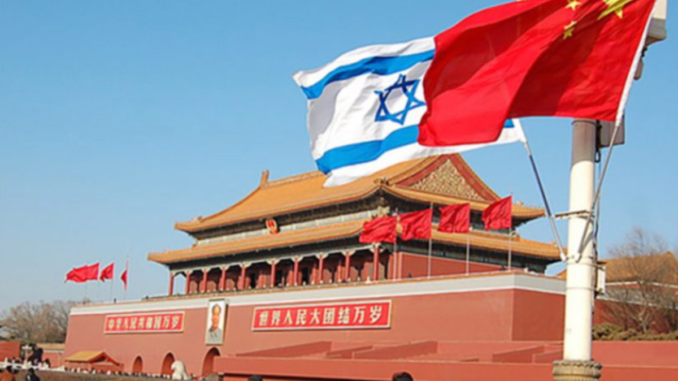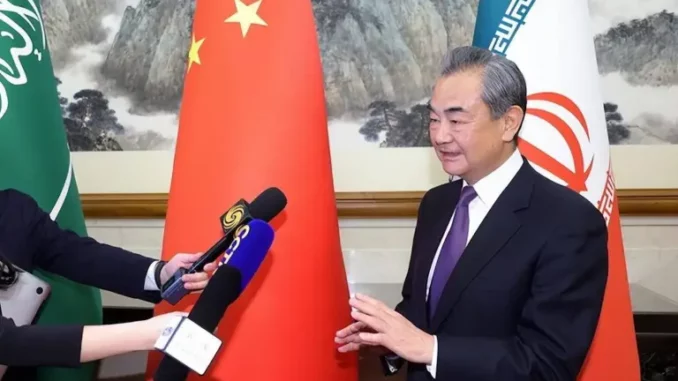T. Belman. This article doesn’t explain why it will depend on Israel. I think, what is suggested is that Israel may attack Iran.
China’s influence has been felt but Israel is far from convinced that the Iran-Saudi deal will halt Tehran’s nuclear intentions
By Paul Rogers, ASIA TIMES MARCH 17, 2023
Israel and China have complex but cordial relations. Image: Twitter
Following political developments in the past fortnight, two state-level policy changes in the Middle East are likely to combine to have a substantial impact on regional stability.
On March 10, in a deal brokered by China and signed in Beijing, Saudi Arabia and Iran agreed to reestablish diplomatic relations and reopen embassies after a seven-year break. While a long way from bringing an end to conflicts such as the bitter war in Yemen, it is, as Simon Mabon noted in an article for The Conversation, a positive development.
The previous week, writing in The Times of London, Middle East correspondent Michael Spencer revealed a plan by Gulf states to restore relations with the Assad regime in Syria.
If this report is accurate, the implications of the two developments for Middle East politics are substantial – not least because of recent social and political developments in Israel and Iran.
Arab detente
The essence of The Times story is that some Arab states want to normalize relations with Damascus – even if this is opposed by the US and its western allies. This should involve an easing of sanctions and more regional economic integration.
It would also mean getting Syria back into the Arab League, from which it has been suspended since 2012 following its brutal suppression of Arab Spring protesters. The move is championed by the United Arab Emirates (UAE) and, along with the Saudi-Iran agreement, has the potential to reorder the balance of power in the region.
The early indications are that beneficiaries of the two developments will include China and the individual regional autocracies involved. Beijing will benefit by taking a key role in facilitating the deal, thereby increasing its status across the Islamic Middle East and north Africa.
China brokered a surprise diplomatic breakthrough between rivals Iran and Saudi Arabia. Image: Twitter / Stimson Center
Russia is also likely to benefit, if less directly. It has carefully nurtured its military connections with Syria over the past decade, starting with its small naval facility at Tartus, which has the potential to give Russia a warm-water Mediterranean port. The port at Tartus is in the middle of a significant expansion that includes the construction of a new floating dock for ship repair.
Russia has also long had the use of the Syrian Air Force’s Hmeimim airbase and has recently extended one of the runways. The base is now something of a military transport hub for links to Libya and states farther south across the Sahel. Moscow also maintains close military connections with Iran, a relationship that is currently bearing fruit in the shape of a supply of armed drones for its war in Ukraine.
Nuclear deal
If both China and Russia benefit from the likely changes, what of the one other key state within the region, Israel?
The long-term response of the Netanyahu government to the new circumstances will depend greatly on the status of the presently defunct Iranian nuclear deal.
A recent period of tension was eased by quick diplomacy by the head of the UN’s International Atomic Energy Agency (IAEA), Rafael Grossi, last month. There has been subsequent talk of a breakthrough on verification and monitoring activities. For the moment, the possibility of a crisis has lessened but not disappeared.
After years of gradual progress while Barack Obama was in the White House, a 15-year agreement was reached in July 2014 that would limit Iran’s nuclear ambitions in return for sanctions relief. The joint comprehensive plan of action (JCPOA) involved Iran, the US, China, France, Russia, Germany and the UK. The deal came into force in 2015.
It was disliked from the start by an Israeli government deeply suspicious of Iran. Israel’s concerns were subsequently partly assuaged by Donald Trump, who ditched the treaty and strengthened the sanctions regime in 2018. Since then, Iran has considered itself free of the limits but has eroded them around the edges rather than ditching them completely.
The current occupant of the White House, Joe Biden, has so far avoided strident condemnation of Iran’s actions. Not so for Israeli prime minister Benjamin Netanyahu.
But at present the Netanyahu government’s approach is also affected by the deep political and social unrest currently affecting Israel itself. This stems from a combination of a long-term division between the secular and the religious.
Secular Israelis tend to want the country’s judiciary to exercise a degree of power over the Knesset legislative body through the country’s supreme court – not least in matters of human rights.
Jewish religious parties, on the other hand, mostly want those powers subject to higher religious authority exercised through the Knesset. Netanyahu’s majority currently depends on the support of his ultra-religious coalition allies. And here lies the problem.
While Netanyahu’s proposals to limit the power of the judiciary may be popular with his far-right parliamentary colleagues it has aroused fierce opposition, with hundreds of thousands of protesters taking to the streets. What makes them particularly significant is that they extend to the armed forces, with many of Israel’s most experienced air force pilots joining the protests.
Traditionally, suspicions of Tehran are held across the political spectrum in Israel. This is rooted in Israel’s idea of itself as a bastion of western-style liberal democracy in a sea of Islamic autocracy. But now the evolving – and increasingly extreme – religious dimension in Israeli politics takes that to an even stronger level of concern over Iran’s real nuclear intentions.
Israel may have succeeded in strengthening economic links with some oil and gas-rich Gulf States, but it is far from convinced that the Iran/Saudi political thaw will have any effect on Iran’s nuclear intentions.
In that it is probably correct. Tehran has little confidence in the stability of the United States’ approach to the JCPOA after what happened under Trump. So, while the developments of the last two weeks may be welcomed by many, on this issue at least, little has changed.
Paul Rogers is a professor of peace studies at the University of Bradford.
This article is republished from The Conversation under a Creative Commons license. Read the original article.





@Ted, Peloni, Channah, I think you are all right. Peloni, you are accurrately describing the right and Ted, Channah, and the author, the left though you are all highlighting different aspects like the three blind men and the elephant.
Here’s a riddle for you. When do two rights make a wrong?
@Ted
Good point.
@Peloni
I noticed that he cast the issue as a secular vs religious one and decided to think about his take on it. I think that Likud is more religious than the opposition parties. One of the reasons for the fierce opposition to reform is that the secular left is concerned that after judicial reform, the country will become too religious for them.(e.g., no buses on Shabbat,). I think they have a real fear about it. So there is something to be said about his take.
That being the case, the opposition is moved by secular fear of the religious bent and the left’s fear of losing power.
Rogers completely mischaracterizes the judicial reform as being a movement largely by the religious while the secular Jews are largely opposed to it. This is completely untrue. In fact, the govt which has been given a mandate to pursue these reforms is equally split between the Likud on one hand and her religious zionists, Shahs and UTJ partners on the other. I don’t think anyone would describe Likud as a religious party. The issue of judicial reform has been spoken of among the various parties, including many members who are now openly opposing it. Of course nothing ever came from these discussions.
This resulted in the people making this issue THE issue of this recent election. In fact, the judicial reform is actually the result of a grass roots movement to have the judiciary become responsive to the people whom it is suppose to serve, rather than rule over them. Those who supported judicial reform were rewarded, while those who opposed it were reduced or completely cast out of the Knesset as a result. But it was not a Religious vs Secular issue. The divide was clearly Left vs Right. Of course, manipulating the conversation towards it being Left vs Right would still leave the Left without a majority, which is why they would like to recast the debate as being between the Religious and the Secular Jews. This attempt to mischaracterize the debate as such is quite dishonest and quite transparent.
I disagree with this article’s statements regarding the basic issue of the protests. The protesters do not want reform because the voting public is moving to the right, and therefore if the elected officials have a role in nominating new judges, they will put some rightwing jurists on the court. The issue is therefore that the new laws reflect what the voters want, whereas the current situation is the left always controls the Supreme Court. So the dispute is over public influence over the court or the self-fulfilling leftist condition we now have.